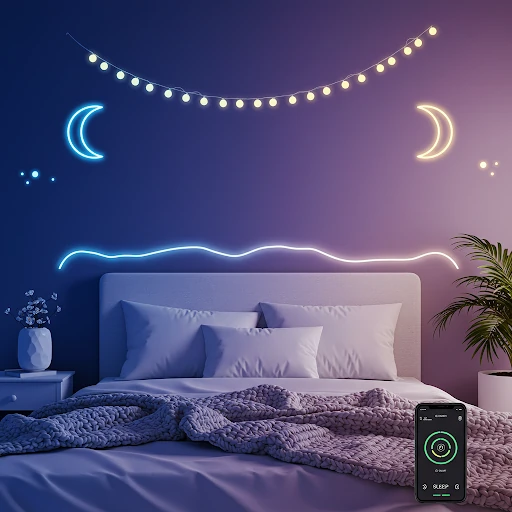Hey friends! 😊 Have you ever felt like no matter how much coffee you drink, you're still dragging through the day? Or maybe you've noticed that your energy levels are all over the place, or you just can't seem to stick to a healthy routine. Here's the thing—sleep might be the missing piece of the puzzle.
Did you know that 50 to 70 million Americans struggle with chronic sleep issues? And most of them don't even realize it! Sleep loss isn't just about feeling tired—it's linked to some serious health risks like diabetes, heart disease, and even depression. But don't worry, we're here to help you understand why sleep matters and how you can start improving it today.
Let's dive in! 🌙
Why Sleep Matters More Than You Think 💭
You've probably heard people say, "I'll sleep when I'm dead," but honestly? That mindset could actually get you there faster. 😬 Chronic sleep loss doesn't just leave you groggy—it messes with your hormones, metabolism, and even your mental health.
Here's the kicker: 80 to 90 percent of adults with sleep-disordered breathing (a condition that disrupts your breathing during sleep) don't even know they have it. And conditions like this can lead to bigger problems, like high blood pressure, weight gain, and diabetes.
How Sleep Loss Affects Your Body 🏥
Diabetes Risk 📊
Let's talk about one of the scariest side effects of sleep deprivation: diabetes. When you don't get enough rest, your body struggles to regulate blood sugar. In fact, studies show that sleeping only four hours a night for six days can reduce your ability to process glucose by 40%! Yikes.
Other Sneaky Side Effects 😴
- Weight Gain: Lack of sleep throws off hunger hormones, making you crave junk food and overeat.
- High Blood Pressure: Sleep deprivation spikes stress hormones, which can raise your blood pressure over time.
- Mental Health Struggles: Ever feel irritable or overwhelmed after a bad night's sleep? Poor rest can worsen anxiety and depression.
Common Sleep Problems (And How to Spot Them) 🔍
If you're tossing and turning at night—or constantly hitting snooze in the morning—you might be dealing with a sleep issue. Here are some common ones:
- Insomnia: Trouble falling or staying asleep. Sound familiar? 🛏️
- Sleep Apnea: Loud snoring or gasping for air during sleep (this is a big one to watch out for!) 😴
- Restless Legs Syndrome: Uncomfortable sensations in your legs that keep you awake 🦿
- Circadian Rhythm Disorders: Feeling wide awake at night but exhausted during the day (hello, night owls! 🦉)
Even if you don't have a diagnosed sleep disorder, consistently getting less than 7-9 hours of sleep per night is still considered sleep loss—and it carries similar risks.
Simple Steps to Sleep Better Tonight ✨
Ready to take back your nights (and your health)? Here are a few easy tips to help you sleep better starting tonight:
Step #1: Stick to a Sleep Schedule ⏰
Try going to bed and waking up at the same time every day—even on weekends. Consistency helps train your body to know when it's time to rest.
Step #2: Create a Relaxing Bedtime Routine 📚
Wind down with calming activities like reading, journaling, or meditating. Avoid screens at least an hour before bed to give your brain time to unplug.
Step #3: Optimize Your Sleep Environment 🌙
Make your bedroom a sleep sanctuary: Keep it dark, quiet, and cool. Invest in comfy bedding and consider using white noise or earplugs if needed.
Step #4: Track Your Progress with Snoozie Buddy 📱
Want to take your sleep game to the next level? Snoozie Buddy is here to help you track your sleep patterns, set reminders for bedtime routines, and identify areas for improvement. It's like having a personal sleep coach in your pocket!
Sleep Is Self-Care—Start Prioritizing It Today 💝
Think about it: You wouldn't skip meals or workouts if you knew they were essential for your health, right? Sleep is no different. It's the foundation of everything else you do—your energy, focus, mood, and even relationships depend on it.
So, let's stop treating sleep like an afterthought. Instead, let's treat it as an act of self-care. By making small changes now, you can protect your health and feel your best for years to come.
Conclusion 🌟
Sleep loss might seem harmless, but it's actually one of the biggest threats to your long-term health. The good news? You have the power to change it. Start small—set a consistent bedtime, create a relaxing routine, and optimize your sleep environment.
Ready for better sleep?
Join our community and get exclusive access to sleep tips and early access to Snoozie Buddy!
Join Now